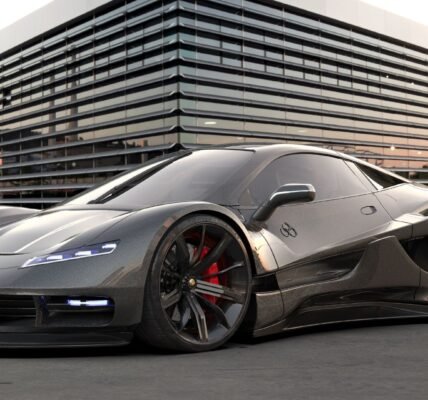The auto industry is undergoing a massive transformation. With every passing year, emerging trends in auto tech shape how we interact with vehicles. From electrification to artificial intelligence, these innovations redefine the driving experience. So, let’s explore the most exciting advancements reshaping the roads we travel.
Electric Power: Paving the Way for a Greener Future
Electric vehicles (EVs) lead as one of the most prominent emerging trends in auto tech. Many manufacturers, such as Tesla and Ford, are investing heavily in EV technology. Now, electric cars are faster, with longer ranges and more efficient batteries. These improvements help more drivers embrace sustainable travel.
Charging infrastructure also expands rapidly, reducing the wait times for EV owners. Cities worldwide support these efforts, installing fast chargers that power up vehicles in minutes rather than hours. This progress makes electric cars more practical and attractive to a larger audience. With fewer emissions, EVs contribute to cleaner air and a healthier planet, marking a significant step in green innovation.
Autonomous Driving: Moving Closer to Self-Driving Vehicles
Autonomous driving remains a key focus in emerging trends in auto tech. Companies like Waymo, Tesla, and GM push boundaries, developing systems to make self-driving cars a reality. These technologies aim to create safer roads by reducing human error, which is the leading cause of accidents.
Advanced driver-assistance systems (ADAS) are already in many cars, offering features like lane-keeping, adaptive cruise control, and automatic braking. As technology improves, these systems work seamlessly, offering a smoother and safer driving experience. While fully autonomous vehicles are not widely available yet, each advancement moves us closer to cars that drive themselves.
Artificial Intelligence: Smart Cars Get Smarter
Artificial intelligence (AI) is another emerging trend in auto tech transforming how cars operate. AI powers advanced systems that enhance safety, efficiency, and convenience. Many vehicles now feature AI-driven voice assistants, making it easy for drivers to interact with navigation, music, and climate controls. This hands-free interaction reduces distractions and keeps drivers focused on the road.
Beyond convenience, AI also boosts safety. Smart features like predictive maintenance alert drivers to issues before they become critical. AI systems analyze vehicle data in real-time, predicting when parts need replacement. This proactive approach helps drivers avoid breakdowns and enhances vehicle longevity, making AI a vital component of today’s automotive advancements.
Connectivity: Cars that Communicate
Connectivity has become a significant emerging trend in auto tech. Today’s cars can communicate with smartphones, infrastructure, and even each other. Known as Vehicle-to-Everything (V2X), this connectivity technology allows cars to exchange information about road conditions, traffic, and hazards, making every journey safer.
In particular, V2X technology helps prevent accidents by warning drivers of potential dangers. It improves traffic flow, as vehicles can adjust speeds based on real-time updates. Some car brands, like Audi and BMW, incorporate V2X in certain models, showcasing the potential of connected cars. As cities invest in smart infrastructure, connected vehicles will become an essential part of modern transportation.
Sustainable Materials: Building Eco-Friendly Interiors
Sustainability is increasingly important to car manufacturers. Using sustainable materials in car interiors is a notable emerging trend in auto tech. Recycled plastics, organic fibers, and plant-based leathers are becoming popular in new vehicle designs, reflecting the shift toward eco-conscious choices.
Brands like Ford and BMW have already integrated eco-friendly materials into their production processes. These materials reduce the environmental impact of car manufacturing while offering high durability. By choosing recycled or organic components, manufacturers lower waste and support a greener production cycle. This commitment to sustainability meets consumer demand for environmentally friendly options, pushing the industry towards a more responsible future.
Advanced Safety Systems: A New Standard in Protection
Safety technology has come a long way, setting a new standard in emerging trends in auto tech. Today’s vehicles come with a suite of advanced safety features aimed at preventing accidents and protecting passengers. Automatic emergency braking, lane departure warnings, and blind-spot monitoring are now standard in many models.
More sophisticated features include pedestrian detection and cross-traffic alerts, making driving safer for everyone on the road. Some vehicles even come with night vision capabilities, improving visibility in low-light conditions. These advancements reflect the industry’s commitment to safety, prioritizing protection for drivers, passengers, and pedestrians alike.
Over-the-Air (OTA) Updates: Cars That Keep Evolving
Over-the-air (OTA) updates are revolutionizing how we maintain our cars. OTA updates allow manufacturers to improve car systems remotely, a major emerging trend in auto tech. Tesla pioneered this technology, but more automakers now follow suit.
With OTA updates, vehicles receive improvements without needing a trip to the dealership. Manufacturers can fix software bugs, update navigation maps, and even enhance performance remotely. This tech keeps cars up-to-date, ensuring they meet modern standards. OTA updates allow vehicles to evolve, reducing the risk of obsolescence and keeping them current with the latest advancements.
Advanced Infotainment Systems: More Than Just Music
Infotainment systems are not just about music anymore. They offer a complete multimedia experience, connecting drivers with everything they need. Enhanced screens, voice commands, and smartphone integration define emerging trends in auto tech.
Apple CarPlay, Android Auto, and Bluetooth make it easy to connect devices, giving drivers access to apps, navigation, and hands-free calling. These systems also feature intuitive interfaces, making them user-friendly and less distracting. With seamless connectivity, infotainment systems offer entertainment and convenience on every drive, making journeys more enjoyable and engaging.
Battery Innovation: Expanding the Limits of EVs
Battery technology continues to improve, pushing EVs further. Solid-state batteries represent a groundbreaking emerging trend in auto tech, providing higher energy densities and faster charging. Better batteries enhance EV range, making them more appealing for drivers who travel long distances.
Companies like Toyota and QuantumScape lead in developing solid-state batteries. These advancements increase EV range and lower charging times, making electric cars more practical for daily use. With improved battery technology, EVs become a stronger alternative to traditional cars, reducing reliance on fossil fuels and lowering emissions.
Hydrogen Fuel Cells: Another Green Solution
While electric vehicles gain popularity, hydrogen fuel cells offer another green alternative. Hydrogen-powered cars produce zero emissions, emitting only water vapor. This emerging trend in auto tech could complement electric vehicles, providing more options for eco-conscious drivers.
Brands like Toyota and Hyundai invest in hydrogen fuel cell technology, seeing its potential for long-distance travel. Hydrogen cars refuel quickly, similar to traditional vehicles, offering convenience for those who need quick turnaround times. With expanding infrastructure, hydrogen technology could become a viable green option alongside electric vehicles.
Conclusion: Embracing Change in the Auto Industry
The emerging trends in auto tech reveal how innovation continues to shape our future. From sustainable materials to advanced safety features, these changes make cars safer, greener, and smarter. As we adopt these advancements, we see a future filled with possibilities.
Each trend represents the industry’s response to modern demands for sustainability, efficiency, and connectivity. The journey ahead promises exciting developments for drivers and passengers alike. Embracing these trends not only enhances our driving experience but also sets the stage for a more sustainable, technology-driven future.





